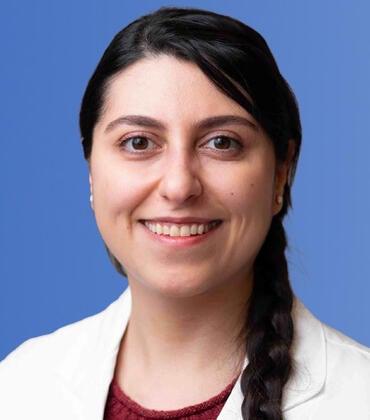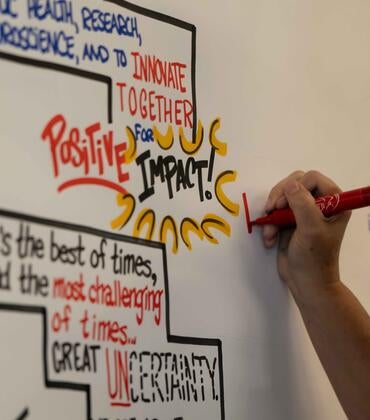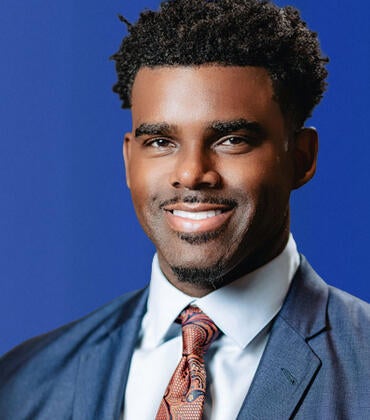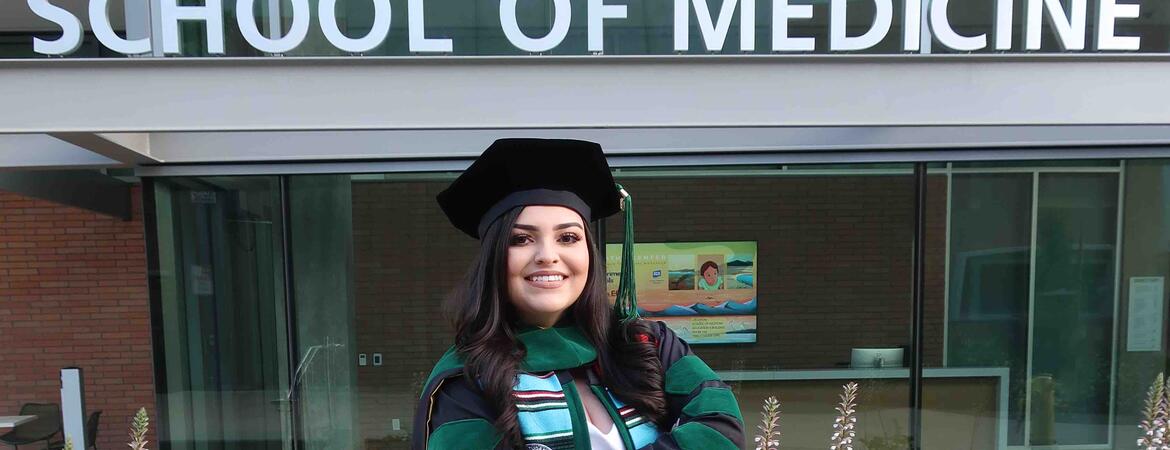
Growing up as an undocumented immigrant, Violeta Covarrubias feared going to the doctor with her family in case the visit led to deportation. After obtaining her American permanent residency as a teenager, Covarrubias enrolled at UCLA as an undergraduate, where she volunteered in hospitals and noticed patients in similar situations.
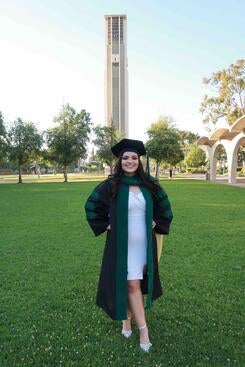
“I felt like I was back in time because sometimes it seemed they encountered similar struggles that I did growing up,” she recalled. The experience launched Covarrubias’ dream of becoming a doctor. “Being able to spend time with them, I realized that there were other people in my shoes too, so I wanted to be a doctor that could make a difference in their care,” she said.
A resident of Pomona, Covarrubias chose to attend the UCR School of Medicine because of its mission to improve healthcare access for people in the area. “I think UC Riverside does a really good job at backing up their mission statement through things like admitting such a diverse student body,” Covarrubias said. “It speaks a lot to its mission statement because they want to diversify our physician workforce and they want physicians that look like the people that we serve in this community.”
Becoming a mentor
As a first-generation college student, Covarrubias at first found the idea of college, and particularly medical school, almost unobtainable. With no one in her family to guide her, she wasn’t sure how to do things like register for the MCAT or apply to medical school. Seeking a mentor, she eventually got in touch with the Latino Medical Student Association (LMSA) at UCLA’s David Geffen School of Medicine. “I met some medical students there who were Latino and who gave me the hope that if they could do it, then I could too,” Covarrubias recalled. “That was pivotal to me even choosing to continue on this journey of applying to medical school.”
Once in medical school, Covarrubias made it a point to become a mentor herself to help students who struggled like she did. She joined the UCR SOM chapter of the LMSA and served as mentorship chair during her second year, where she helped organize events, connected undergraduate students to medical student mentors, and mentored undergraduate students through the Future Physician Leaders summer program at the SOM.
“One of my main goals is to help others who also want to pursue medicine and who have a similar background to mine but don't know how to get there,” Covarrubias said. “If there's anyone that is thinking about pursuing this career but is questioning whether or not they can do it, I hope they don't feel afraid to reach out to individuals that have done it or to ask questions,” she continued. “It's not a sign of weakness, it’s just that we have to help each other out.”
Covarrubias said she couldn’t find many physicians who identified as Latinx in the Inland Empire to mentor her on her own journey to becoming a physician, and would like to see more in the area. “Hopefully when I come back [as a physician], I can be that person,” she said.
Becoming a mother
Covarrubias’ childhood experiences with medical care led her to pursue the specialty of obstetrics and gynecology (OB/GYN). Medical visits with her sister, Aurora Gonzalez, and her single mother, Irma Barajas, had always made her feel vulnerable when, she said, they should have been a place that felt safe.
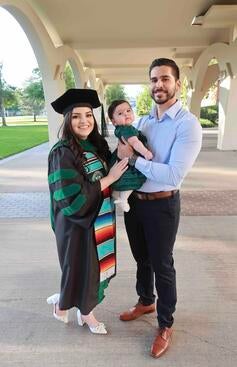
“Specifically the field of OB/GYN, you do sometimes feel a little bit vulnerable, just given the anatomy and some of the medical problems that we're dealing with,” Covarrubias said. The hesitancy in Latino culture to openly discuss periods or other female issues also fueled her wish to work with patients who shared her background--and particularly those who reminded her of her mom. “When I did my OB/GYN rotation at the Riverside University Health System here, I saw a lot of patients that were immigrants like my mom, that were single parents expecting their first or second child, and I could be that comfort for them,” Covarrubis said. “Having that similar background was really empowering and I feel like it did make a difference in a time when they're dealing with something that is very sensitive.”
Covarrubias also has personal experience with the field as she gave birth to her first child as a medical student. After nearly eight years with her husband, Miguel Covarrubias, she wanted to have kids like others in her family. While her decision was unusual given the rigors of medical school, Covarrubias pointed out, “People always say that there's never a right time, so then I realized if there's no right time, there's never a wrong time in a sense.”
She felt nervous about opening up to other students or faculty about her desire to become pregnant during school, but was encouraged by her faculty mentor Stephanie J. Handler, an assistant clinical professor of health sciences in the OB/GYN department. “She was like, this is a great idea, this is the best time to do it,” Covarrubias recalled.
Handler suggested that Covarrubias aim to deliver in the middle of her fourth year of medical school to give her time with her baby before starting residency. With her more flexible fourth-year schedule, online coursework, and vacation time, Covarrubias decided to go for it.
“The fact that she listened to my advice…speaks a lot to Violeta's humility and openness,” Handler said. “She serves as a shining example of how good planning and being proactive can really contribute to success.”
After conceiving in March 2023, Covarrubias completed her away rotations from July through early October before beginning her residency interviews later that month.
Covarrubias finished her final interview on Friday, December 15, and went into labor Saturday night. “[My daughter] came a little bit early, so that was a little bit unexpected, but I was done with my interviews and she was like, ‘here I come,’” Covarrubias recalled with a laugh. “So the timing worked out really well.”
In January, Covarrubias used her fourth-year vacation time to stay with her baby, Galilea Covarrubias, before returning to rotations in March. “It’s been a little bit difficult navigating being on a rotation and being away from baby for the first time, but I feel like it's preparing me for residency,” she said.
Covarrubias felt content with her decision to give birth as a medical student. The main thing she would change, she said, was being more open about her condition while she was pregnant.
During her away rotations, Covarrubias struggled with whether to disclose her pregnancy. “Unfortunately, there is somewhat of a stigma with wanting to start a family, and I didn't want that to interfere in my performance or my evaluation,” she said. Her virtual residency interviews, where the camera showed Covarrubias only from the chest up, also gave her the option of hiding her pregnancy.
“I could say [to myself] now that you should have just disclosed that you were pregnant and if there's a program that is not supportive of that, then they're not the right program for you,” said Covarrubias. “But when you're in that position, you've worked so hard to get to this point and you don't want that to be the reason for a program to rank you lower or look at you in a different way,” she continued. While she said that medical culture is slowly changing to recognize physicians as people with their own lives, more progress needs to be made. “By sharing my story and being open about it, I hope that I can inspire others who want to start a family that they can also do it. It’s very difficult, but I don't think that your life should stop because you are in this training or because of medicine.”
In the end, Covarrubias said, she found support when sharing her pregnancy with residents and faculty she worked with on her UCLA rotation.
“I wish I could have been one of the people that said, this is who I am and this is what my situation is, and the [residency] program can take it or leave it,” Covarrubias added. “If I was to go back, I would try to tell myself to be more open about this beautiful stage of my life because it was something so exciting and hiding it was a little sad.”
Coming full circle
Now, Covarrubias is returning to UCLA as a resident with her MD. In her undergraduate experience at the school, she remembered feeling alone and unsure of her path, lost among the large number of students and seeing very few who looked like her.
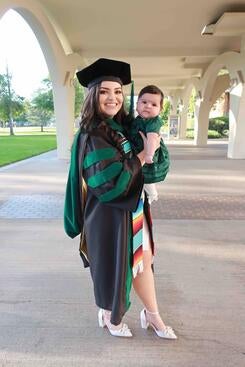
However, completing a rotation at UCLA as a medical student and her recent match into the residency program helped conquer her doubts.
Before her UCLA rotation, “I still felt a little bit nervous and wondered if I was going to feel like I felt when I was an undergrad there,” Covarrubias recalled. “But I realized how much I had grown in these past couple of years, and the fact that I could be there as a medical student and now incoming resident, it's a full circle moment. It makes me really happy and proud that I could do it and hopefully inspire other minority students who have this big dream and sometimes feel like it's unreachable that they can do it too.”
Covarrubias also appreciates that UCLA residents rotate at a county hospital, Olive View-UCLA Medical Center, which serves a similar patient demographic to that of the Inland Empire. “It was really important for me that they had that county aspect because my goal is to make it back here to Riverside, and once I'm an attending [physician] and practicing on my own, I can use what I've learned in the county hospital to implement over here,” Covarrubias said. “Being able to come back and serve this patient population in this community is why I went into medicine, so to me returning is not really a question.”
Covarrubias said she feels prepared to help patients who share a similar background to hers. When Covarrubias worked with Latino patients as a student, she noticed that when she spoke Spanish, they seemed more willing to open up to her and share their stories. “Sometimes I would share a little bit of my story too, and I feel like it's an unspoken thing where they could relate to me and trust that I had an idea of what they might be going through,” she recalled. “I feel like that's really powerful, just knowing some of the struggles that you face being an immigrant to this country and navigating being undocumented, being low income, or uninsured.”
Covarrubias also looks forward to setting an example and encouraging others to overcome challenges on their path to becoming a doctor.
“It's difficult, and you're going to feel like you're on your own doing it, but you're not,” Covarrubias said. “A lot of the times where I would step into a room and someone was speaking Spanish, I always thought about my own family members and being able to participate in these patients’ care is such an honor, it really makes all of the difficulties that you encounter in this journey worth it,” she continued. “Don't let go of this dream just because it's scary and it's tough, because your future patients are waiting for you.”
